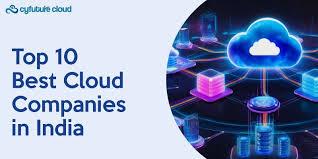cloud computing companies has become a cornerstone of modern business operations. Whether it’s providing on-demand access to computing resources, data storage, or software services, cloud computing enables organizations to operate more efficiently, scale with ease, and innovate at a faster pace. Today, several cloud computing companies dominate the industry, setting the standard for the future of technology. These companies — Amazon Web Services (AWS), Microsoft Azure, Google Cloud, and others — have emerged as industry leaders, offering cutting-edge services that meet the demands of businesses, governments, and consumers across the globe. But what makes these cloud computing companies so successful? Let’s dive into the key factors that contribute to their cloud computing providers.
1. Comprehensive and Scalable Solutions
Amazon Web Services (AWS)
One of the primary reasons Amazon Web Services (AWS) dominates the cloud computing industry is its ability to provide a comprehensive suite of services that cater to businesses of all sizes and sectors. AWS offers more than 200 services across various domains, including computing, storage, machine learning, artificial intelligence, analytics, and database management. The vast range of services ensures that companies can find solutions for almost every technical need.
Moreover, AWS’s infrastructure is highly scalable. AWS offers flexible and scalable resources, which means businesses can easily adjust their usage based on demand. For small startups to large enterprises, AWS has the right tools to meet diverse computing needs.
Microsoft Azure
Microsoft Azure also offers a highly comprehensive cloud portfolio, ranging from AI and machine learning to Internet of Things (IoT) solutions. Like AWS, Azure’s ability to scale up or down based on demand is one of the key features that businesses find attractive. Azure’s hybrid cloud model is also a major selling point, enabling companies to use both on-premise infrastructure and cloud services seamlessly. This flexibility, combined with extensive global data center coverage, allows Azure to cater to diverse customer needs while maintaining reliability and performance.
Google Cloud Platform (GCP)
Google Cloud is another major player in the cloud computing market. While it may not have as large of a customer base as AWS and Azure, it offers industry-leading services in specific areas such as data analytics, artificial intelligence (AI), and machine learning. Google Cloud’s open-source technology, Kubernetes for container management, and its strong offering in big data and analytics (such as BigQuery) have made it a go-to solution for organizations looking for sophisticated data solutions.
Why It Matters:
The scalability, flexibility, and comprehensive range of solutions offered by these cloud computing giants are crucial in attracting a wide array of clients, from small businesses to large global enterprises. These platforms empower organizations to easily adopt and scale technologies that support growth and innovation without having to worry about infrastructure management.
2. Market Leadership and Innovation
Amazon Web Services (AWS)
AWS has maintained its market leadership due to continuous innovation. Amazon was one of the first companies to provide cloud computing as a public service, giving it a significant head start in building its infrastructure and global reach. AWS’s ability to innovate and expand its offerings — from infrastructure-as-a-service (IaaS) to platform-as-a-service (PaaS) and software-as-a-service (SaaS) — has ensured its dominance in the cloud space. Services like Amazon EC2 (Elastic Compute Cloud), Amazon S3 (Simple Storage Service), and AWS Lambda (serverless computing) have set the benchmark for the cloud industry.
AWS invests heavily in research and development, often introducing new features and services before its competitors. The company is also known for offering services that target emerging technologies like quantum computing, AI, and machine learning, which gives it an edge over the competition.
Microsoft Azure
Azure has quickly become a top choice for businesses looking for cloud solutions. One of Azure’s key strengths is its integration with Microsoft’s extensive software ecosystem, including Windows Server, SQL Server, and Office 365. Azure’s hybrid capabilities, including Azure Stack and Azure Arc, enable companies to use a combination of on-premise and cloud-based services, providing a unique flexibility that other platforms lack.
Microsoft also invests heavily in innovation and emerging technologies. The company’s acquisition of GitHub, a code-hosting platform, further strengthens Azure’s appeal to developers. Azure’s AI and machine learning offerings have been enhanced through partnerships with OpenAI, enabling users to tap into cutting-edge technologies.
Google Cloud Platform (GCP)
Google has long been a leader in search, advertising, and AI, and its expertise in these areas carries over into its cloud offerings. Google Cloud has made significant strides in artificial intelligence (AI) and machine learning (ML) capabilities. Google’s TensorFlow, an open-source ML framework, is one of the most widely adopted tools by developers and enterprises alike. Google Cloud’s focus on AI-driven solutions helps businesses automate processes, enhance customer experiences, and gain insights from their data.
Additionally, Google’s investments in edge computing and global network infrastructure (Google Cloud’s global backbone) have helped improve performance and reduce latency, providing companies with better access to data and applications.
Why It Matters:
These cloud computing giants are not only maintaining their leadership positions through innovation, but they are also setting the stage for future growth. As companies look to leverage emerging technologies like AI, machine learning, quantum computing, and blockchain, these providers are ensuring they are at the forefront, offering customers the most advanced tools to drive digital transformation.
3. Global Reach and Reliability
Amazon Web Services (AWS)
AWS has one of the most extensive global networks of data centers, allowing it to provide highly reliable services with low latency. The company operates in multiple geographic regions and availability zones, which ensures that businesses have access to cloud resources near their target markets. AWS’s resilience and uptime guarantees are a major draw for enterprises looking for reliability.
AWS’s global reach also allows businesses to meet regional data compliance and regulatory requirements. This is particularly important for industries like finance and healthcare, where data sovereignty and privacy are crucial.
Microsoft Azure
Azure’s global reach is another factor contributing to its dominance. The platform operates in over 60 regions worldwide, with data centers in more countries than AWS or Google Cloud. Azure’s compliance certifications — covering industries such as healthcare, finance, and government — ensure that businesses can rely on Azure for secure and compliant cloud services. Azure’s ability to offer low-latency services due to its vast network infrastructure is also a major selling point.
Google Cloud Platform (GCP)
While Google Cloud has a smaller global presence than AWS or Azure, it still has a strong network of data centers that enables it to offer reliable and fast cloud services. Google Cloud’s extensive investments in networking technologies, including its global fiber-optic network, give it a significant edge in providing low-latency connections across the globe. Google’s emphasis on cutting-edge networking infrastructure ensures that customers experience high-speed data processing and fast content delivery.
Why It Matters:
A global infrastructure network is essential for providing businesses with uninterrupted service, low latency, and high availability. AWS, Azure, and Google Cloud’s ability to deliver reliable, high-performance cloud computing services to businesses worldwide has contributed to their dominance.
4. Security and Compliance
Amazon Web Services (AWS)
Security is a top priority for AWS. The company offers a range of security features, including identity and access management, encryption, and threat detection tools. AWS also complies with numerous international security certifications and standards, such as GDPR, HIPAA, and SOC 2, ensuring that companies can trust AWS with their most sensitive data.
Microsoft Azure
Microsoft has a long history of prioritizing security, and Azure continues that tradition. Azure offers a comprehensive suite of security services, including Azure Security Center and Azure Sentinel, which help businesses identify and mitigate potential threats. Azure also adheres to a wide range of compliance standards, making it a preferred choice for industries that require strict data protection protocols.
Google Cloud Platform (GCP)
Google Cloud is renowned for its focus on security. The company employs a multi-layered approach to security, incorporating encryption by default, identity management, and data protection. Google Cloud’s Security Command Center allows businesses to monitor their cloud resources for security threats and vulnerabilities.
Why It Matters:
Security and compliance are paramount in cloud computing. AWS, Azure, and Google Cloud’s industry-leading security features provide businesses with peace of mind, knowing that their data is protected from breaches and vulnerabilities.
Conclusion
The dominance of cloud computing companies like AWS, Azure, and Google Cloud is no accident. These companies have managed to build their empires by offering comprehensive solutions, embracing continuous innovation, expanding their global reach, and ensuring that security remains a top priority. As the demand for cloud services grows, these companies will continue to lead the way, setting the bar for the next generation of cloud technologies. For businesses seeking reliable, scalable, and secure cloud solutions, these cloud computing giants offer the tools and resources necessary to succeed in the digital age.




